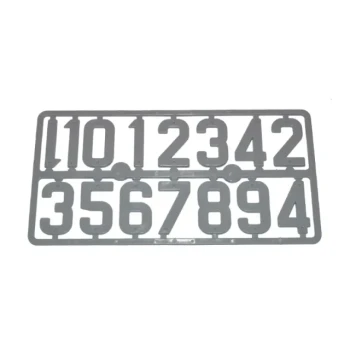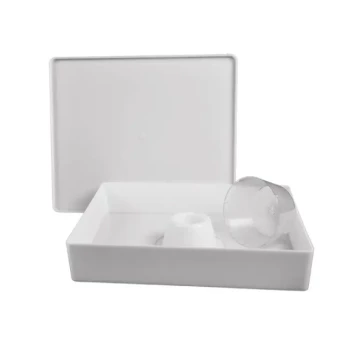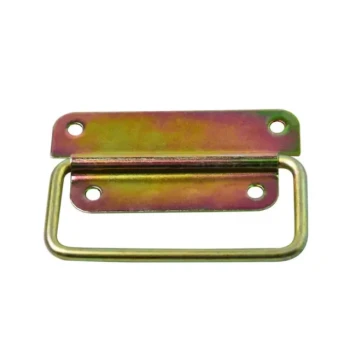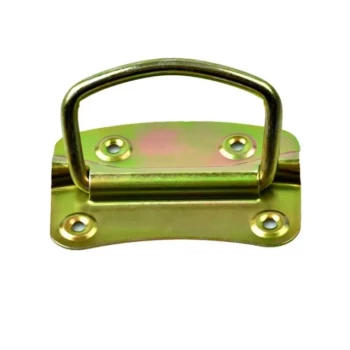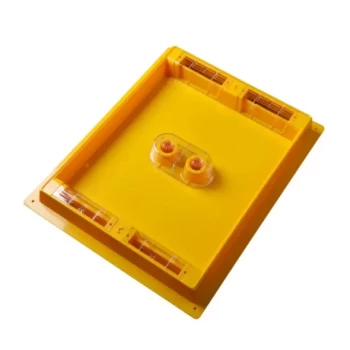At its core, a nucleus hive is a small, fully-functioning honey bee colony used by beekeepers as a multi-purpose management tool. Its primary uses range from creating new colonies and raising queens to rescuing failing hives and serving as a resource bank for a larger apiary.
A nucleus hive, or "nuc," should not be seen merely as a small beehive. It is the fundamental building block for a resilient and proactive apiary, functioning as a resource generator, a queen nursery, and an insurance policy against common colony failures.
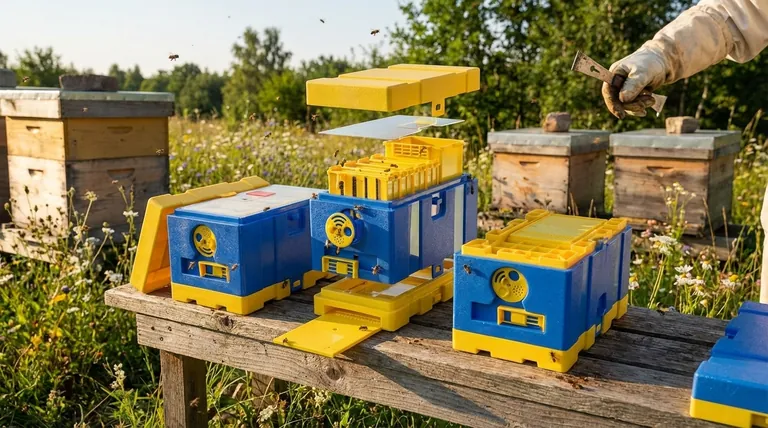
The Nucleus for Colony Growth
One of the most common reasons to establish a nuc is to increase the number of colonies in your apiary. This is a fundamental step in expanding your operation or replacing winter losses.
Making a "Split"
A nuc is the perfect vehicle for creating a new colony from an existing one, a process called a split. By taking a few frames of brood, honey, and bees—along with the old queen or a new queen cell—from a strong hive, you can establish a new, viable colony in the nuc box.
Hiving a Swarm
A nuc is the ideal size for capturing and hiving a swarm of bees. Its smaller, less intimidating space is often more readily accepted by a swarm than a full-sized deep hive body.
The Nucleus for Queen Management
Effective queen management is the cornerstone of successful beekeeping, and the nuc is the most critical tool for this task. It provides a controlled environment for all queen-related activities.
Mating New Queens
After a split or swarm, a colony needs a new, mated queen. A nuc provides a safe, small, and resource-rich environment for a virgin queen to mature, take her mating flights, and begin laying eggs without the pressures of managing a massive population.
Requeening a Full-Sized Colony
Introducing a new queen directly into a large, queenless colony can be risky, as the bees may reject and kill her. A much safer method is to first establish her in a nuc. Once she is laying well, you can unite the entire nucleus hive with the queenless colony, ensuring a higher acceptance rate.
Banking a "Spare" Queen
Proactive beekeepers often use nucs to house "banked" or spare queens. This could be an old but genetically valuable queen you wish to preserve, or simply a young, mated queen kept on standby to quickly replace an underperforming or lost queen in a production hive.
The Nucleus as an Apiary Support System
Beyond creating new hives, nucs are best understood as a flexible support system for your primary honey-producing colonies. They act as a living resource you can draw from as needed.
Rescuing a Queenless Colony
Discovering a hopelessly queenless hive can be a crisis. A nuc with a laying queen can save it. By transferring the nuc's frames—queen, bees, and all—into the failing hive, you can rapidly restore its population and productivity.
Boosting Weaker Hives
A strong nuc produces an excess of brood (developing bees). You can transfer a frame of sealed brood from a healthy nuc to a weaker production colony. This infusion of new bees provides a significant population boost without weakening your strongest hives.
Overwintering for Resilience
In many climates, a strong, five-frame nuc can be successfully overwintered. This provides you with a backup colony in the spring, ready to replace any winter losses or to be used as a resource for boosting other hives as the season begins.
Understanding the Trade-offs
While incredibly useful, maintaining nucleus hives requires a conscious investment of resources and attention.
Resource Commitment
The bees, brood, and food stores used to create and maintain a nuc are resources that are not directly contributing to a honey crop in a production hive. It is a long-term investment in apiary health over short-term honey yield.
Management Overhead
A nuc is not a "set it and forget it" tool. It is another colony that requires regular inspections for health, pest management (like varroa mites), and feeding, especially during its initial establishment.
Increased Vulnerability
Due to their smaller population and food stores, nucs are more vulnerable than full-sized colonies. They are more susceptible to robbing by other bees, pest pressure, and extreme temperatures, requiring more vigilant oversight from the beekeeper.
How to Leverage a Nucleus in Your Apiary
Your strategy for using nucs should align directly with your beekeeping goals.
- If your primary focus is rapid expansion: Use nucs aggressively to make splits from your strongest hives throughout the season.
- If your primary focus is honey production: Maintain one or two nucs per apiary as support units to requeen and boost your main hives, ensuring they are always at peak strength.
- If your primary focus is resilience: Overwinter at least one nuc to serve as an insurance policy against winter losses and a source of early spring brood.
Mastering the nucleus hive transforms you from a reactive to a proactive beekeeper, giving you the tools to solve problems before they become catastrophes.
Summary Table:
| Primary Use | Key Function | Benefit to Apiary |
|---|---|---|
| Colony Growth | Making splits, hiving swarms | Rapidly increases hive count, replaces losses |
| Queen Management | Queen mating, requeening, banking | Ensures strong, productive queens, reduces colony failure |
| Apiary Support | Rescuing failing hives, boosting weak colonies | Enhances overall apiary health and honey production |
| Overwintering | Providing backup colonies | Acts as insurance against winter losses, spring resource |
Ready to strengthen your apiary with reliable nucleus hives and professional beekeeping supplies?
At HONESTBEE, we supply commercial apiaries and beekeeping equipment distributors with the high-quality nucleus boxes, frames, and equipment needed to implement these powerful strategies. Our wholesale-focused operations ensure you get durable, purpose-built supplies to support colony growth, queen management, and overall apiary resilience.
Contact HONESTBEE today to discuss your specific needs and learn how our products can help you build a more proactive and successful beekeeping operation.
Visual Guide
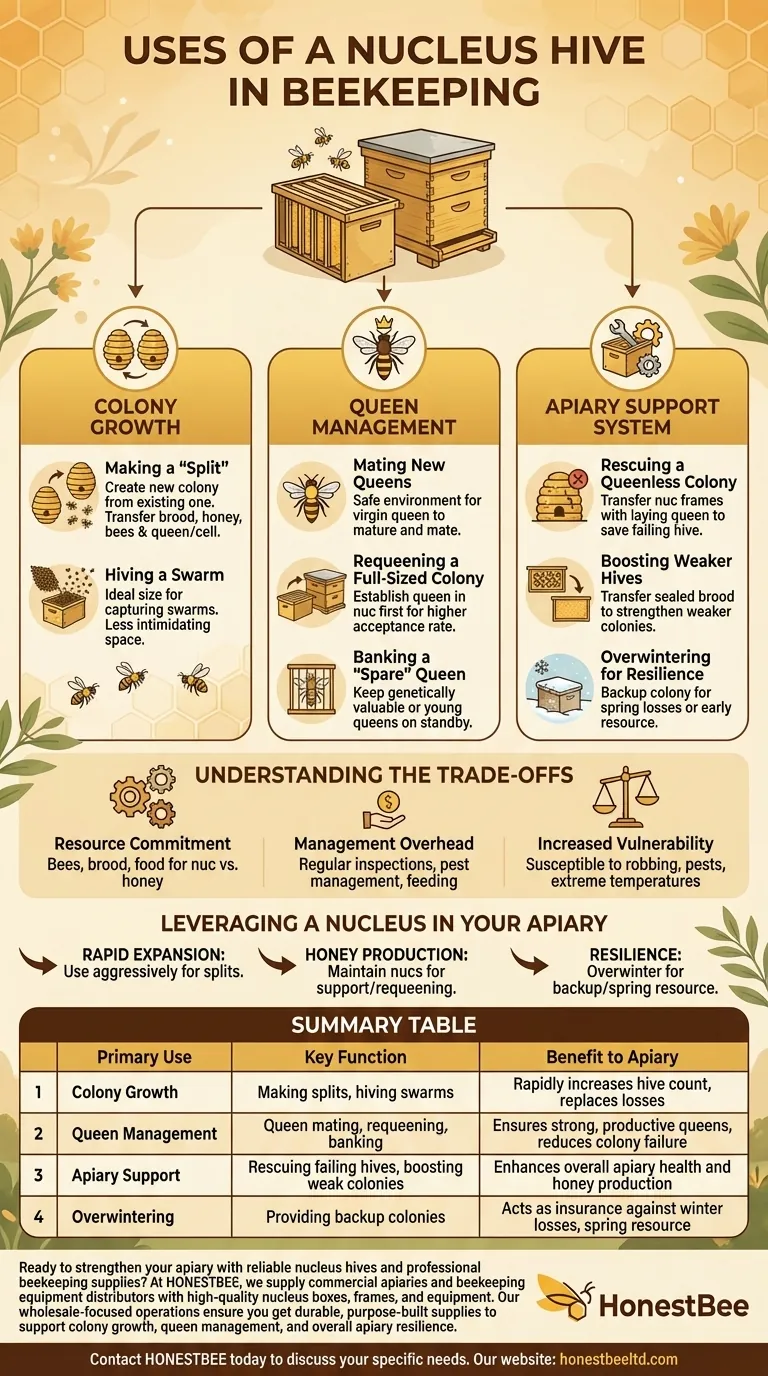
Related Products
- 4 Frame Plastic Nuc Boxes for Beekeeping Bee Nuc Box
- HONESTBEE Professional Long Handled Hive Tool with Precision Cutting Blade
- Black Plastic Beetle Barn Hive Beetle Trap for Beehives
- Modern Flat-Mount Hive Number Set for Beekeeping
- Professional Large-Format Hive Number Set for Beekeeping
People Also Ask
- What is the function of nucleus (nuc) boxes in commercial beekeeping? Scale Your Apiary with Strategic Asset Management
- What is a 'nuc' and what are its primary uses in beekeeping? Essential Guide to Nucleus Colonies
- When can nucleus colonies (nucs) be created? Optimal Timing for Apiary Growth and Survival
- Why is a nucleus colony (nuc) often preferred over a bee package for hive stability? Boost Colony Success
- What are the immediate steps for installing a bee nuc upon arrival? Tips for Colony Success



